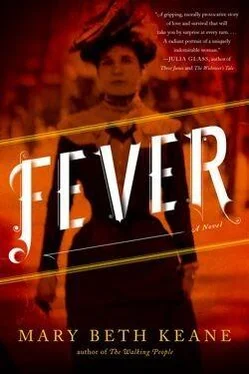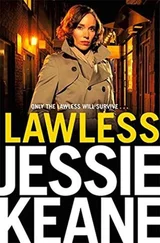“The papers have been sympathetic to your side,” Mr. O’Neill said as he gathered his things. “That will help, too. Don’t be surprised if reporters come out here looking for you.”
“Will they be allowed to see me?”
“I’ll arrange it. I don’t see how the hospital can get around it.”
“And what about other visitors, could you get them to allow that, too?”
Mr. O’Neill touched her shoulder. “Try to be patient. I know it’s been a long time since you’ve seen your friends. But we have to proceed carefully, and remember, you’ll be home soon.”
“Wait,” she said as he began to leave. She had to address it now or else it would hang over her until they saw each other again. “I haven’t worked in over two years. I had a little money saved, but—”
Mr. O’Neill held up his hand. “There’s no fee.” She narrowed her eyes. He seemed decent, but no one was that decent. She decided to worry about that later, once she was free. As soon as he left, she got out a sheet of paper.
Dear Alfred,
Finally! I have news. I’ve just met with a lawyer named O’Neill and he seems certain he can get these people to let me go. There will be a hearing, I’m not sure when. Soon. I’ll send the details when it’s scheduled. I know it’s been a very long time and we have much to talk about but I miss you, Alfred. And I’m worried about you. I can’t wait to see you again. Let’s just forget these horrid two years and celebrate when we see each other soon. I am the same, I hope. Are you?
Mary
As Mr. O’Neill had predicted, within days of their habeas corpus application there was another newspaper article about her in the New York American, a long one, and for the first time, they used her real name. Her appeal was popular news in the city, and reporters began to request face-to-face interviews. The hospital allowed no more than one reporter per day.
“Write down about the closeness of this place,” she reminded each one who made the trip. “And the cot. Do you see how it cups in the middle?” The numbers used to condemn her were inconsistent: one had twenty-two sick, one dead; another had thirty sick, two dead; the third had twenty-eight sick, six dead. But none believed that was the whole story. She’d been cooking since she arrived in America in 1883, but the records that led to her discovery and capture went only as far back as 1901. “You can tell me,” each reporter said in a different way, and each made a show of putting down his paper and pencil like Mary was some kind of imbecile who didn’t know how the world worked. “When did you know?” The young man from the Herald had a vein that jumped at his temple.
“When did I know what?” she would reply, willing herself to stay calm. She offered each reporter one of the black-currant scones the hospital cook had sent down with John Cane. “I’ve never been sick a day in my life, and that’s all I have to say on the matter.”
Each reporter shrank away from the plate. “No?” she said, holding the plate aloft a few moments longer, as if the person sitting across from her might change his mind.
Ever since arriving in America, she kept her head down and she worked. She’d found Alfred, but that was no crime. They couldn’t lock her up for not being married, for demanding a good wage and getting it, for not attending any brand of church services and loving instead to spend Sundays roaming Washington Market, and then going to hear the fiddler who played on the corner of Fulton and Church Streets. She was thirty-nine years old and healthy. Did any of them realize the strength it took to lift a pot of boiling water? To knead bread for thirty minutes? To pound one of the tougher cuts of beef until it was tender and ready for her skillet? At the end of a workweek she was exhausted in her bones, in the muscles of her shoulders and her back, but still, she often walked all the way from the Bowens’ brownstone on the Upper East Side to her place farther downtown because she liked using her own steam, didn’t feel like squeezing herself into a streetcar.
“Miss Mallon,” the reporter from the Herald asked, “do you yourself believe you carry Typhoid Fever and pass it to those for whom you cook?”
She made sure to look him directly in the eyes. “No, I do not.”
“Then why has the Department of Health gone to the trouble and expense of keeping you here?”
“That’s exactly what I would like to know.”
And when it came time for each reporter to leave, she walked with him down to the dock and spoke of other things. The weather. That Frenchman’s attempts to cross the English channel in an aeroplane. The hurricane in Texas. “Where do you live?” she asked each one, coming around to it just before arriving at the dock. One was from Brooklyn. Another from Fort Lee. But the writer for the Herald lived on Twenty-Eighth Street and Third Avenue; upon hearing it Mary held her breath. Surely, living so close, he’d passed Alfred in the street, brushed up against him at the grocer, sat beside him at Nation’s Pub, maybe struck up conversation. The thought came to her that she should give this man a message to bring to Alfred, have him climb the stairs of their building and knock on the door to their rooms. But the reporter was backing away already, thanking her for her time, stepping down into the boat, and Mary felt the chance slip past her like a life ring thrown into the water and swallowed by the waves.
• • •
On the morning of the hearing, Mary wondered once again who was paying Mr. O’Neill’s legal fees. John Cane said it was possible some of the New York American ’s readers had pitched in to pay for her defense since the writer took such a forgiving view. He also pointed out that sometimes Mr. Hearst got involved in cases that interested his readers. “Who named John Cane an authority on these matters?” Mary asked him. He’d been getting a little too comfortable with himself lately, standing on the single step outside the door to her cottage as he told her the hospital gossip, having a say-so on matters that didn’t concern him in the least. He brought the papers down to Mary to read out the most important passages. That he couldn’t read the sentences himself didn’t matter when it came to forming opinions on everything from the garbage strike to city taxes to Mary’s case.
“And what do you mean a forgiving view? They told the story accurately.”
“And sided with you, it seemed to me,” John said, crossing his arms and leaning against the rail as if he were born and raised on that very spot.
“Who else would they side with?” Mary demanded.
“I’m only saying,” John Cane said. “I’m only making a point.”
Mary felt nervous enough about the day ahead, and didn’t see how John Cane gave himself leave to make points when he was no more literate than a flea. All she knew was once she stepped onto the ferry later that morning, she might never return to North Brother again.
Her last letter to Alfred was brief. On a small piece of lined paper she’d written only the address of the courthouse, the date, the time, then folded it inside a copy of the article that had appeared in the New York American . Surely, when he unfolded the article and read her note, he would remember the last time they’d been down on Centre Street together — how many years ago? Eighteen? Twenty? It was late fall, the weather brisk. They were deciding what to do with the rest of their day when a page ran down the courthouse steps shouting “Verdict is in!” and then tripped, tumbling head over heels until he landed at their feet. “Well?” Alfred asked as he offered his hand and the boy let himself be pulled up. “Guilty,” the boy said as he staggered and blinked, uninjured. Mary and Alfred had walked on, laughing with heads bent so the boy wouldn’t see them, until all of a sudden Alfred pulled her into an alley, deep into a shadow, where he pressed her against a wall and put his rough hands on either side of her face and told her he loved her, that no one would ever love her as much, and she, feeling a tug in her belly like a hand clenched into a fist, could not say it back, not yet, but felt it there, inside her, waiting to be pried open.
Читать дальше












